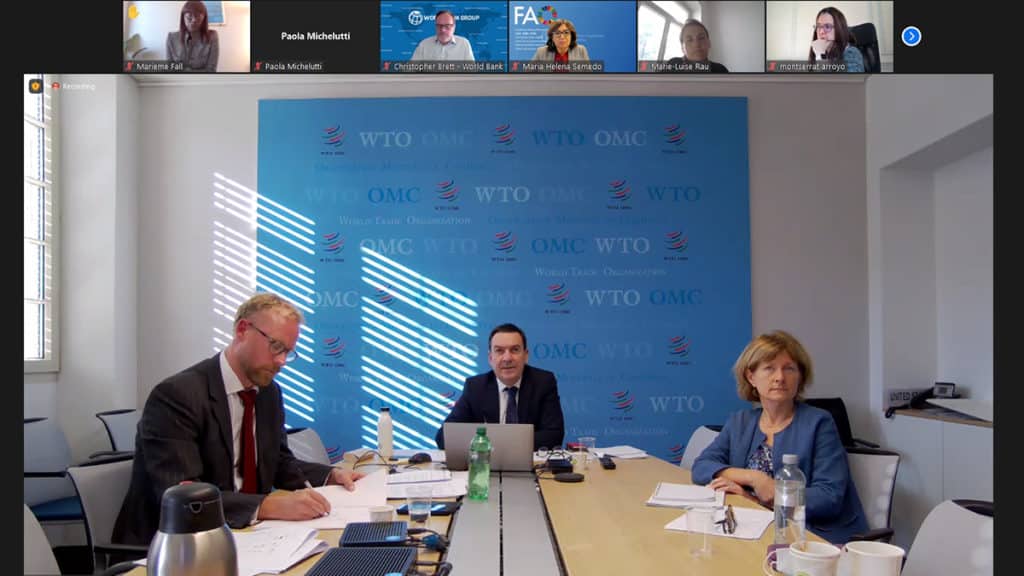El DGA Paugam encomia la importante función catalizadora del STDF con respecto a la creación de capacidad sanitaria y fitosanitaria

El 14 de octubre, el Director General Adjunto de la OMC Jean-Marie Paugam destacó la función que desempeña el Fondo para la Aplicación de Normas y el Fomento del Comercio (STDF) a la hora de hacer frente a nuevos desafíos en un momento en el que el cambio climático está afectando a la capacidad de los países en desarrollo y los países menos adelantados (PMA) de garantizar la inocuidad de los alimentos y la sanidad animal y vegetal. El DGA Paugam, quien presidió la reunión virtual del Comité de Políticas del STDF, hizo hincapié en los pequeños agricultores, los productores, los comerciantes y los Gobiernos que se benefician de la ayuda del STDF para cumplir las prescripciones sanitarias y fitosanitarias en el marco del comercio, con arreglo a las normas internacionales.
(de momento sólo en inglés)
«The world around us is changing rapidly,» DDG Paugam said. «Trade patterns are shifting, and the use of non-tariff barriers is on the rise. The growth in digitalization and new technologies present challenges but also opportunities. Climate change is having an impact on food safety, and the occurrence of new pests and diseases. The COVID-19 pandemic is adding to the challenges and serves as a wake-up call that we need partnerships like the STDF more than ever to work together and find solutions.»
DDG Paugam called for collective action «to scale up and sustain the impressive results achieved by the STDF to date,» and to build on the work of the STDF’s founding partners – the Food and Agriculture Organization (FAO) of the United Nations, the World Organisation for Animal Health (OIE), the World Health Organization (WHO), the World Bank and the WTO. He stressed the importance of expanding the STDF’s outreach and impact «by capitalizing on the STDF’s broader network and partnerships to influence SPS capacity development at national, regional and global level.»
«The STDF is making excellent progress in delivering its current Strategy (2020-2024) by convening and connecting diverse stakeholders with a role in SPS capacity development, delivering demand-driven projects and activities, learning from collaborative and innovative approaches, and driving change and influencing SPS capacity development more broadly,» he added.
FAO DDG Maria Helena Semedo noted that «the STDF’s work is contributing fully to the new FAO strategy to support the transformation to more efficient, inclusive, resilient and sustainable agri-food systems. She called for stronger collaboration, innovative partnerships and inclusive business models to achieve sustainable food and agriculture and related trade. «The challenges are daunting: food prices are rising, as are hunger and malnutrition. The FAO looks to the STDF to support its efforts and is committed to work with the STDF’s other founding partners … to transform our food systems and achieve better production, better nutrition, a better environment, and ultimately better lives for everyone,» she said.
OIE DDG Montserrat Arroyo stressed the «very comprehensive and inclusive process» leading up to the STDF’s current strategy and reiterated OIE’s support for the STDF’s mission and vision. She highlighted OIE’s critical role in setting international standards to support safe trade in animals and animal products and in building the capacity of veterinary services to improve the prevention and control of animal diseases worldwide.
Francesco Branca, WHO’s Director of the Department of Nutrition and Food Safety, emphasized the good collaboration with the STDF and commended the STDF Secretariat’s work in keeping all the projects moving forward despite the challenges that COVID-19 has posed. He highlighted that trade is a strategic priority in WHO’s new Global Food Safety Strategy and saw opportunities to further deepen the collaboration with the STDF in adopting Codex standards and strengthening national food control systems.
Bill Gain, Head of the World Bank’s Trade Facilitation Support Programme, praised the STDF for its convening role during the COVID-19 crisis and its work on SPS electronic certification (eCert). He said the World Bank will explore how it can become more involved in delivering STDF projects on the ground. Looking forward, he recommended that the impact of climate change on SPS risks and capacity should be further addressed as part of the STDF’s good practice work.
Marième Fall, Officer-in-Charge of the WTO’s Agriculture and Commodities Division, said: «The WTO houses the STDF Secretariat and trust fund. We are extremely grateful for the continued active engagement of the founding partners, our donors, developing country experts and beneficiaries.» She also drew attention to the video marking the launch of the 2020 STDF annual report, where WTO Director-General Ngozi Okonjo-Iweala noted that the STDF, by working to enable small-scale farmers to meet international health and safety standards for their products, helps people benefit from trade.
The STDF Policy Committee is the STDF’s highest body and guides the strategic direction of the STDF partnership. In addition to the STDF’s founding partners, donor members are represented in the Policy Committee by France, Germany and The Netherlands. Three STDF developing country experts from Bhutan, Jamaica and Kenya also participated in the Committee meeting. More information on the STDF partnership, its activities and projects is available on the STDF website.














